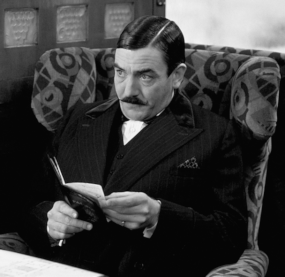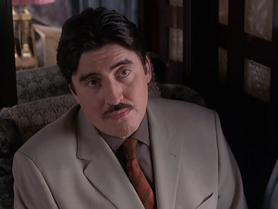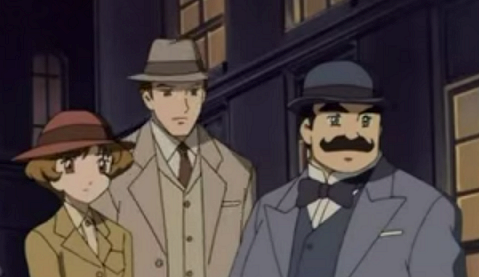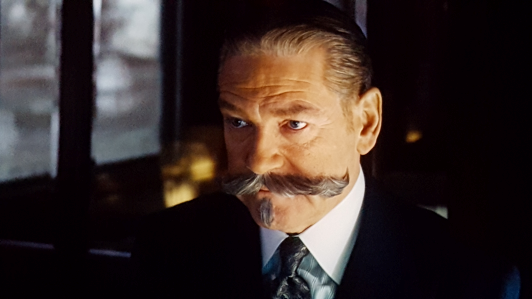Poirot in TV and in Film
Hercule Poirot made his debut on film in the 1931 movie Alibi, based on the stage play of the same name. The play was adapted by Michael Morton from the novel The Murder of Roger Ackroyd. Poirot was played by Austin Trevor as a tall handsome detective (no mustache!)--the most complete opposite in appearance from Agatha Christie's creation. Interestingly enough, Trevor played Poirot two more times, in Black Coffee--again in 1931--and Lord Edgware Dies in 1934. Black Coffee was originally a play Agatha Christie wrote herself after Morton had done Alibi. (Lord Edgware Dies, of course, is based on the novel of the same name). Twickenham produced the first two Trevor movies and the studio called Real Art produced the last. Trevor said once that he was probably cast as Poirot simply because he could do a French accent.
In 1960, Metro-Goldwyn-Mayer announced they had signed a contract for a sum of a million pounds to the rights to all of Christie's unadapted mystery stories for TV. The US magazine TV Guide stated that actor Jose Ferrer would star as Hercule Poirot in a TV series planned for the 1961-62 season. Later in October 1961, MGM announced it was reworking the Hercule Poirot series and that Ferrer would not be playing the title role. Sadly, nothing became of that Poirot series. However, MGM started producing Miss Marple films with Margaret Rutherford in 1961.

Tony Randall portrayed Poirot in The Alphabet Murders, produced by MGM.
So, the next time Poirot appears on television was in 1962 on CBS. Actor Martin Gabel starred as Poirot in a General Electric Theater production entitled Hercule Poirot (what else?). The program was an adaptation of "The Disappearance of Mr. Davenheim." The show was to be a pilot episode for a weekly series, but the series never took off.
The next time we see Poirot is in the cinema with The Alphabet Murders (based on The ABC Murders) in 1966, starring Tony Randall (made-up with a bald cap and everything) as Poirot. Hastings was played by the corpulent actor Robert Morley as a clumsy bungler. The movie was more comical than anything else. The role of Poirot was to be for Zero Mostel (from "The Producers" fame), but Agatha Christie objected to his casting and the script, which even called for a bedroom scene for the dapper detective! On a better note, Austin Trevor visited the set during filming and Margaret Rutherford (actress who portrayed Miss Marple in 4 films) made a cameo appearance in the film.

Albert Finney was Poirot in the faithful adaptation of Murder on the Orient Express (1974), which included an all-star cast.
The next project with Poirot was the excellent EMI movie adaptation of Murder on the Orient Express in 1974. An all-star cast included Sean Connery, John Gielgud, Vanessa Redgrave, Michael York, Anthony Perkins, Lauren Bacall, and the Oscar-winning performance by Ingrid Bergman. Let's not forget Albert Finney portraying Poirot. He does (in my estimation) an excellent Poirot. His performance was a little different than what I had expected, but it was well done and refreshing. The acting was superb and the costumes just excellent. It was such a faithful adaptation of the novel. It was at the time the most successful British film ever made and got the stamp of approval from Agatha Christie herself.
EMI returned to Poirot in a theatrical release of Death on the Nile in 1978, based on the novel of the same name and starring this time Peter Ustinov as Poirot. The movie was actually filmed in Egypt under horrendous temperatures, and the poor crew had no hotel reservations. The cast was an all-star one also, with: Bette Davis, David Niven, Mia Farrow, Angela Lansbury, and Jack Warden. The movie poster (painted by Richard Amsel who did the "Raiders of the Lost Ark" poster) featured an Egyptian King holding a knife in one hand and a revolver in the other.
Peter Ustinov returned as Poirot in another production, this time by Universal of Evil Under the Sun, premiering in 1982. The movie also starred Diana Rigg, James Mason, and Roddy McDowall. The director of the movie was Guy Hamilton, also director of Bond movies like "Goldfinger", "Diamonds Are Forever", and "Live and Let Die". Another theatrical release of a Poirot movie came in 1988, starring Ustinov again as Poirot. This was Appointment With Death, this time an EMI production, also starring Carrie Fisher and Lauren Bacall.
Ustinov wasn't done, however, with portraying the Belgian detective. He appeared as Poirot in three made-for-television movies: Thirteen at Dinner (1985), Dead Man's Folly (1986), and Murder in Three Acts (1986). The first of these was based on Lord Edgware Dies and was made by Warner Brothers. It also starred Faye Dunaway and David Suchet as Inspector Japp, just before he himself played the famous detective. (Interesting note is that Suchet once said that playing Japp was "possibly the worst performance of my career.") The next TV movie of Ustinov's was Dead Man's Folly, again by Warner Bros. and shown in 1986. The role of Ariadne Oliver the novelist was portrayed by Jean Stapleton; Tim Piggot-Smith also starred. The last of the Ustinov movies was Murder in Three Acts in 1986 (based on Three-Act Tragedy). It starred Jonathan Cecil and Tony Curtis. Instead of the setting being in England, it was changed to Acapulco.

Alfred Molina as Poirot in Murder on the Orient Express (2001), in a "modern" adaptation of the famous novel.
Before the latest actor doing Poirot is discussed, another made-for-TV movie was shown on CBS in April 2001, starring the English actor Alfred Molina as Poirot in Murder on the Orient Express. He's the Poirot of the 21st Century, using his gray cells of the brain with modern technology. (Would Poirot really use a laptop computer? No, I don't think so.) For what Molina's given here, and a tough act to follow, Molina does a fair job of doing Poirot. However, the script is the main fault here, with Poirot getting a love interest, with the changes of characters and the way Poirot goes about his investigations. Of all of the Poirot stories to adapt, why was this one picked? It's nearly impossible to do a "new version" after the Albert Finney film: it was near perfection because it was so faithful to the novel. This TV movie received bad reviews from historians, fans, and critics alike. Although I like Molina as an actor, this movie really stunk.
On 2004, the Japan Broadcasting Corporation (NHK) aired animated Poirot and Marple stories. The show is titled Agatha Christie's Great Detectives Poirot and Marple. For the Poirot episodes, some of the stories included were Peril at End House, The ABC Murders, "The Kidnapped Prime Minister", "The Adventure of the Egyptian Tomb", "The Adventure of the Cheap Flat", and "The Plymouth Express".

Poirot appears with his friends Hastings and Maybell in the episode Death in the Clouds. This story was the final one of the Japanese animated series Agatha Christie's Great Detectives Poirot and Marple.
In these stories, Captain Arthur Hastings works alongside Poirot. What is curious, however, are the two characters created for the show: Maybell West and her pet duck, named Oliver. In the show, Maybell is the daughter of Miss Marple's nephew, Raymond West. Even more curious, in the novels by Agatha Christie, Raymond never had a daughter. Not only is Marple the great-aunt of the 16 year old Maybell, but Maybell is Hercule Poirot's assistant in the cartoons! I've also wondered if the pet duck Oliver is named after Ariadne Oliver, a mystery writer in the books who's a friend of Poirot's. To visit the official site of this animated series, click here (language is in Japanese).
The most recent actor portraying Hercule Poirot is the English actor David Suchet, with many agreeing his portrayal of the Belgian detective as the definitive one. Suchet began filming in 1988 the program Agatha Christie's Poirot for London Weekend Television. This long-running series also starred Hugh Fraser as an excellent Captain Hastings. In preparation for his portrayal of Poirot, Suchet read every short story and everything Christie wrote about the detective. He has done an exceptional job in being faithful to Poirot's character. To read more about David Suchet's portrayal of the detective, click here for the featured article.

David Suchet was television's Hercule Poirot from 1989 to 2013, in 70 episodes of Agatha Christie's Poirot. He is shown here from the televised adaptation of Three Act Tragedy (2010).
The program had been on hiatus for several years but it had resumed with new episodes being produced in conjunction with the cable channel A&E. in 2000. However, early in 2011 ITV Studios (the producer of the series in recent years, although it has always aired on ITV since its inception) announced it was no longer making new episodes. David Suchet had said that he had hoped to film all the remaining 6 stories of Poirot. The reason behind this was simply a lack of funds at the studio (see article at "The Daily Edge"). Later in November 2011, ITV announced that they would film new episodes of Poirot, with returning star David Suchet. Indeed the remaining stories were filmed and completed, with the series ending with the final Poirot story Curtain, which premiered in the UK on November 13, 2013. American audiences were privileged to watch the final stories broadcast on television and on Acorn TV (online). The US premiere of Curtain was available only on Acorn TV August 25, 2014. Starting with season 7 of Agatha Christie's Poirot, you may stream the stories from the Acorn TV website. (Acorn Media Group is owned by RLJ Entertainment, part owner of Agatha Christie Limited.) For the first 6 seasons, the Poirot stories are available through BritBox, an online video on-demand service owned by BBC and ITV.

Kenneth Branagh starred as Poirot in 2017's Murder on the Orient Express and directed the film as well. The cast includes many well-known names in Hollywood in completing the list of suspects.
A new film adaptation of Murder on the Orient Express held its world premiere on November 2, 2017 at the Royal Albert Hall in London. In the US the film was released on November 10 by 20th Century Fox. The film was directed by Kenneth Branagh who also starred as Hercule Poirot along with an all-star cast that includes Johnny Depp, Michelle Pfeiffer, Judi Dench, Daisy Ridley, Leslie Odom Jr., Josh Gad, Penelope Cruz, Willem Dafoe, and Derek Jacobi. The beautifully filmed adaptation takes place in 1934 with lavish sets, scenery, costuming, and music. Critics had mixed reviews ranging from Branagh's direction and interpretation of Poirot to the performances of the ensemble cast to the film's climax.